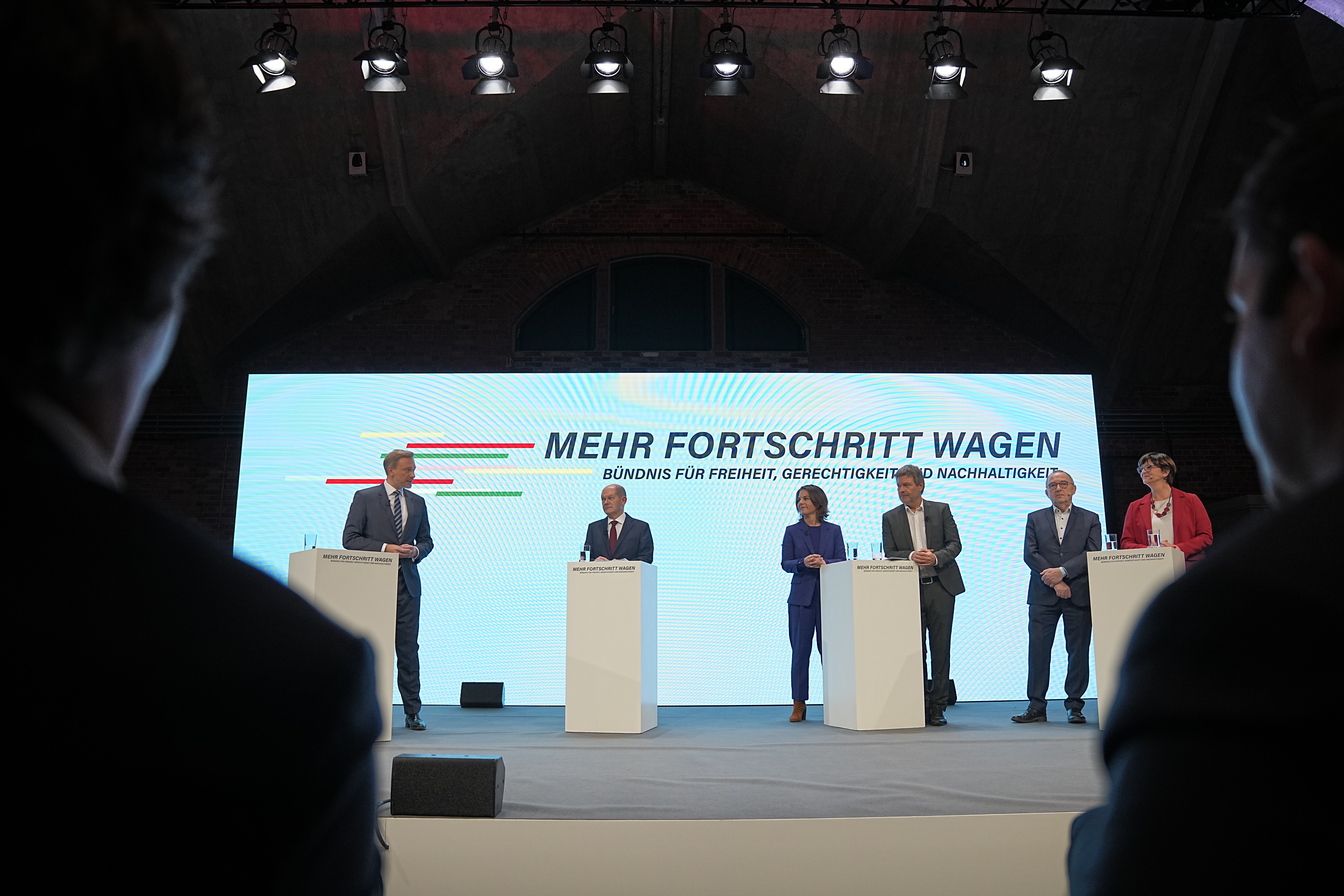Coalition agreement
The New Alliance of Economic Growth and Climate Protection

The coalition agreement is in place, faster than expected. In the midst of the pandemic, the coalition partners of SPD, Greens and FDP are demonstrating determination. The signal: "Look, we're ready to go, also because external circumstances demand a speedy formation of a new government."
Apart from the Corona pandemic itself, the new government will have to overcome major long-term challenges. All three parties agree on that. The venue, in which the coalition agreement was presented in late November, carried symbolic power: a factory hall at Westhafen, Berlin’s largest inland port, that had been converted into a convention center. The setting was also very much in line with the title of the coalition agreement: "Daring more progress: Alliance for freedom, justice, sustainability". The title already alludes to what lies ahead for the coalition partners. Metaphorically speaking: a project full of construction sites, full of risks. In short: A bold attempt to meet the challenges of the future.
The coalition agreement - a document of 6,018 lines on 177 pages - is of course not a fun read. Wading through the text, one notices that it was written as a compromise in endless meetings deep into dark November nights. This is hardly surprising, given that the three parties involved come from different areas of political philosophy, which are also listed alphabetically in the document's subtitle: the FDP stands for freedom, the SPD for justice, the Greens for sustainability, at least according to the self-image of the three parties involved, which are now becoming partners - the voters wanted it that way.
Is there a core message of the treaty? Yes, there is, and that in itself is something positive, because it sets this coalition agreement apart from the multitude of other quite arbitrary political declarations that promise this or that without ever adding up to a proper course of action. In the traffic light coalition agreement, this is quite different, because the guiding principle - despite the abundance of topics it covers - is as clear as day: the coalition partners want climate protection, but they want to achieve it through innovative growth, not through strict self-limitations and de-growth. The Greens and the FDP in particular are responsible for pushing the coalition agreement in this direction: The Greens by placing high priority on climate policies and the FDP by emphasizing the importance of economic growth. Put in an intellectual puzzle, these two directions represent two crucial puzzle pieces that are complementary and fit together - something that representatives of both political families have long emphasized.
Therefore, in this new government coalition there are no winners and losers. Looking at the reactions from the far left and right of the political spectrum confirmed this. The left immediately complained that the coalition agreement is basically an FDP program. The AfD lamented that Green ideas dominate the handwriting of the agreement. The criticism from the CDU parliamentary group was also revealing, in that representatives employed the standard argument that the program's financial viability was not assured.
There is only one thing that is correct about these rather conventional complaints: There are still risks associated with the practical implementation of the agreement, as it is the case with every government program, however. The success heavily depends on how the three coalition partners cooperate with each other in day-to-day business. On a positive note, the start of this new government project was not bad in two respects, however: First, how the three parties handled the negotiation talks was extraordinarily discreet; almost nothing was leaked, much to the dismay of the media. Second, the distribution of portfolios wisely followed the programmatic priorities of the three parties: The implementation of the climate program is primarily in the hands of the Greens, while the FDP-led ministries are responsible for innovation, growth and financial stability. The SPD on the other hand is responsible for social affairs, labor and security. This is a good fit. Everything else remains to be seen.
One aspect that is crucial for this new government project is the mutual ideological respect and recognition of the FDP and the Greens. Together, the two parties received 46 percent of the vote among first-time voters. This success can be mainly attributed to the fact that both parties presented consistent programs for the future: the Greens with an ecological focus and the FDP with an economic focus. This is a breakthrough – and a path forward, away from polemics that could be heard earlier on both sides. What is more, this cooperation is clearly in the interest of the younger generation - and also of paramount importance for democracy: If Germany is to be governed from the center, this can only be done by bringing together precisely these ideological lines of the FDP and the Greens. Even though admittedly in an alliance of convenience, not in a love match. The basic positions of both parties remain firmly apart - as pillars of credibility in the political world of compromise.
The rest will be decided in political practice. We will see whether the climate policy goals - ranging from the timely phase-out of coal and the expansion of renewable energies to the abandonment of the internal combustion engine - can actually be achieved. And we will see whether innovation and growth can be strengthened despite unfavorable demographic trends through special write-offs, the promotion of a start-up culture and immigration of skilled workers, as well as reforms of the welfare state. And we will have to see whether there is in fact enough budget to finance all this, although the latest tax estimate showed that the economic recovery after a deep slump – similar to the situation after the financial crisis – is likely to generate much more revenue than was expected earlier by fiscal pessimists. Post-Corona forecasts are extremely difficult, but the lessons of the past are by no means discouraging.
That's just the way politics is: risky and uncertain. At least we now have an ambitious program that could end the era in which Germany systematically lived off its substance - economically, socially and ecologically. One is inclined to say: "Fasten your seat belts! It's going to be a bumpy road." But at least we know which direction we are headed. And that is a good one.
